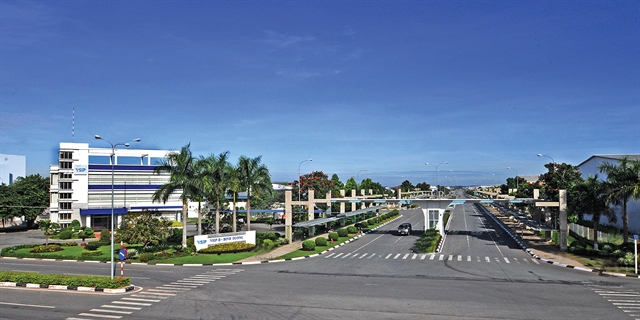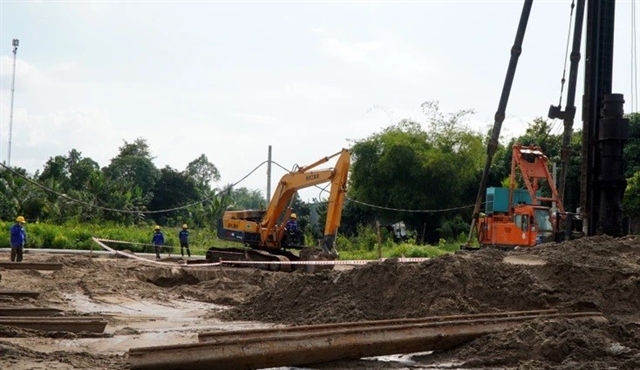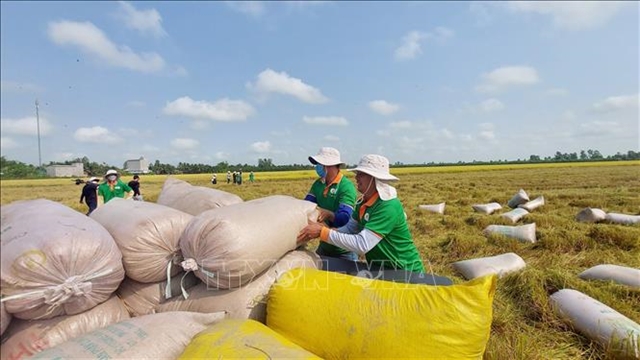 Economy
Economy

 |
| Construction of a public road in the southern province of Đồng Tháp. VNA/VNS Photo |
HÀ NỘI The first few months of 2024, disbursement of Việt Nam's public investment using foreign funds reached just over 8.5 per cent, said Võ Hưu Hiền, deputy director of the Ministry of Finance's (MoF) debt management department, during a conference yesterday in Hà Nội.
According to data from the TABMIS-Treasury And Budget Management Information System, as of May 15, the Ministry of Transport (MoT) and the Ministry of Agriculture and Rural Development (MARD) reported they have allocated over 10 per cent of the annual target. Meanwhile, eight other governmental ministries and agencies said they have not been able to keep up with this year's disbursement target.
According to the MoF, it was expected that by the end of next month, the disbursement rate by governmental ministries and agencies could reach as high as 15-17 per cent, in line with the pace from the same period during 2021-23.
The ministry said the disbursement of public investment funds remains important, contributing to promoting socio-economic growth and ensuring the development of mid-term public investment plans for 2021-2025.
Measures have been taken to speed up the process, with governmental ministries and agencies urging investors to report monthly. Meanwhile, local governments have set up steering committees with leaders assigned to the direct supervision and implementation of projects. Inspections have also increased in frequency with local leaders taking a proactive approach to help investors address ongoing issues and concerns.
Key factors contributing to hampering the process included a lack of finished works due to delays in land clearance and resettlement, slow approval of project designs and sluggish bidding and contract completion. In addition, various projects have been told to make adjustments to policies, loan agreements and financial plans, according to the MoF.
Nguyễn Thanh Tuấn, director of the World Bank's project management office in Hanoi University, said the office has finished feeding capital estimates for 2024 into the TABMIS with a budget of VNĐ645.7 million.
Tuấn said the university has been having difficulties in gaining approval, an important step to complete before the project can be implemented, which requires the donor to agree to the overall project plan, annual plan, project operation handbook, bidding plan for packages, terms of reference for consulting firms, bidding invitations and contractor selection. As a result, the process slowed due to continuous updates and adjustments.
In addition, it was further complicated by the fact the university must complete numerous dossiers, which must be reviewed by the State Treasury and the MoF. As a result, the possibility of projects being cancelled and the risk of unused budget funds for the year remains high.
Nguyễn Anh Dũng, deputy head of the MoT's investment planning department said the ministry has received VNĐ4.36 trillion in funding this year. The largest obstacle, according to the ministry, is land clearance as many infrastructure projects run through forests. The lengthy administrative procedures to change the lands' purposes could take up to a year and a half, often adding significantly to the overall cost of the projects.
At the conference, governmental ministries and agencies discussed and identified issues that may hinder the disbursement process, including those land clearance delays, bidding and technical designs. Projects also have to go through procedures to adjust investment policies, adjust projects, loan agreements and may experience delays in obtaining approval from donors.
The MoF said the ministry has been working alongside other ministries and agencies to monitor and implement solutions to accelerate the disbursement of public investment capital to achieve a disbursement of 95 per cent target set in Resolution 01/NQ-CP on tasks and key solutions to implement the socio-economic development plan and state budget for 2024. VNS




